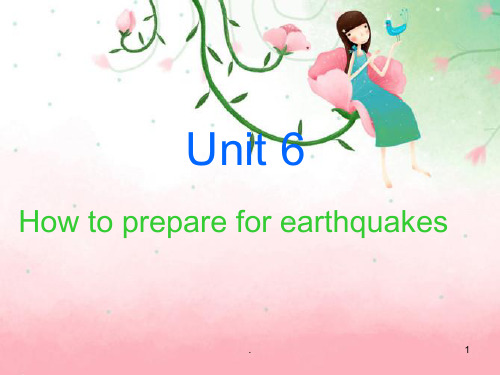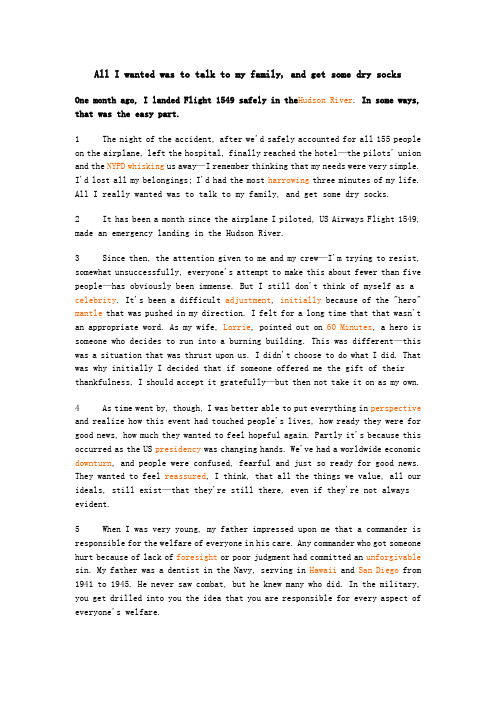新视野3unit6课件
新视野英语教程第三版unit6PPT课件

Exploring the Topic
Column A
•New Year’s Day •Labor Day •Youths’ Day •Children’s Day •Christmas
Matching game
Column B
4 May 1 June 1 January 25 December 1 May
Exercises
Text A
Exercises
Around the Topic
Section A
Section B
Section C
New York City
It is the largest city in the United States and one of
the largest in the world, situated on New York Bay at the mouth of the Hudson River. It comprises (由······组成) five boroughs (行政区): Manhattan (曼哈顿区) (New York co.), the heart of the city, an island; the Bronx (布 朗克斯区) (Bronx co.), on the mainland, northeast of
Around the Topic Section A
Section B
Section C
Leading in
Fill in the blanks with an appropriate phrase concerning holidays.
• On New Year’s Eve, people fire__fi_r_e_c_r_a_c_k_e_r_s__.
新视野大学英语_读写教程3__第6单元_earthquake__PPT

Kobe Earthquake - Jan 17,1995 -
←Damage to Buildings in Kobe City
Damage to Water Pipes → (φ800mm)
Kobe Earthquake - Jan 17,1995 -
Fires happened frequently, and a lot of houses were burnt down.
Kobe Earthquake - Jan 17,1995 -
The sixth floor of the city office was crushed.
The Mid Niigata Prefecture Earthquake - Oct 23, 2004 –
Damage to Small-scale Water Supply Facility due to Landslide
Monk involved in yushu earthquake relief
The Japanese earthquake -March 11, 2011-
Japanese earthquake nuclear power station started to leak out
Houses collapsed
The Mid Niigata Prefecture Earthquake - Oct 23, 2004 –
Damage to water pipes under the ground
The Mid Niigata Prefecture Earthquake - Oct 23, 2004 -
Emergency Water Supply by Water Wagon
新视野大学英语第三册第六单元课文讲解PPT课件

regularly check and reinforce their homes, place
heavy objects in low positions, attach cupboards
and cabinets to walls, and fasten doors so that
they will not open accidentally during an
Unit 6
How to prepare for earthquakes
.
1
Paragraph 1
Ideally, people would like to know when an earthquake is going to happen and how bad it will be. In both Japan and China, people have long believed that earthquakes can be forecast. In Japan, scientists have wired the Earth and sea to detect movements. The Chinese have traditionally watched animals and plants for warning signs of earthquakes. For example, the Chinese have noted that before an earthquake, hens' behavior changes—they refuse to enter their cages at night. They have also noticed that snakes come out of the ground to freeze to death and that dogs bark a lot, even
新视野大学英语综合教程3 课文及课文翻译Unit6

All I wanted was to talk to my family, and get some dry socksOne month ago, I landed Flight 1549 safely in the Hudson River. In some ways, that was the easy part.1 The night of the accident, after we'd safely accounted for all 155 people on the airplane, left the hospital, finally reached the hotel—the pilots' union and the NYPD whisking us away—I remember thinking that my needs were very simple. I'd lost all my belongings; I'd had the most harrowing three minutes of my life. All I really wanted was to talk to my family, and get some dry socks.2 It has been a month since the airplane I piloted, US Airways Flight 1549, made an emergency landing in the Hudson River.3 Since then, the attention given to me and my crew—I'm trying to resist, somewhat unsuccessfully, everyone's attempt to make this about fewer than five people—has obviously been immense. But I still don't think of myself as a celebrity. It's been a difficult adjustment, initially because of the "hero" mantle that was pushed in my direction. I felt for a long time that that wasn't an appropriate word. As my wife, Lorrie, pointed out on 60 Minutes, a hero is someone who decides to run into a burning building. This was different—this was a situation that was thrust upon us. I didn't choose to do what I did. That was why initially I decided that if someone offered me the gift of their thankfulness, I should accept it gratefully—but then not take it on as my own.4 As time went by, though, I was better able to put everything in perspective and realize how this event had touched people's lives, how ready they were for good news, how much they wanted to feel hopeful again. Partly it's because this occurred as the US presidency was changing hands. We've had a worldwide economic downturn, and people were confused, fearful and just so ready for good news. They wanted to feel reassured, I think, that all the things we value, all our ideals, still exist—that they're still there, even if they're not always evident.5 When I was very young, my father impressed upon me that a commander is responsible for the welfare of everyone in his care. Any commander who got someone hurt because of lack of foresight or poor judgment had committed an unforgivable sin. My father was a dentist in the Navy, serving in Hawaii and San Diego from 1941 to 1945. He never saw combat, but he knew many who did. In the military, you get drilled into you the idea that you are responsible for every aspect of everyone's welfare.6 During every minute of the flight, I was confident I could solve the next problem. My first officer, Jeff Skiles, and I did what airline pilots do: We followed our training, and our philosophy of life. We valued every life on that airplane and knew it was our responsibility to try to save each one, in spite of the sudden and complete failure of our aircraft. We never gave up. Having a plan enabled us to keep our hope alive. Perhaps in a similar fashion, people who are in their own personal crises—a pink slip, a foreclosure—can be reminded that no matter how dire the circumstance, or how little time you have to deal with it, further action is always possible. There's always a way out of even the tightest spot. You can survive.7 Even though we had a successful outcome, it's human nature to wonder about the what-ifs. The second-guessing was much more frequent, and intense, in the first few days at night, when I couldn't sleep. It was hard to shut my brain off and get back to sleep. Sometimes I didn't, I couldn't. It was part of the post-traumatic stress that we have all felt, that each of the crew members has reported to each other.8 It's funny—for the first two weeks after the accident, Jeff kept telling me, "I just want my old life back." But the other day he finally said for the first time, "You know, this is OK. I'm learning to like this. This is good."I think he's coming to terms with what's happened. He realizes that he's entitled to the attention. That he can still be true to himself. That accepting it isn't selling out.9 Besides the outpouring of support from the passengers, the most touching sentiments I have received have been from other pilots. They tell me that because of the years of economic difficulties faced by the airline industry and its employees and the decreased respect for the profession, they have not felt proud to go to work—some of them for decades. Now, they tell me, they do. And they thank me for that. They thank us, the crew, because we've reminded people what all of us do every day, what's really at stake. They feel like they've regained some of the respect they'd lost.10 What's next? I will return to flying for my airline—when I'm ready. I'm not sure when that will be. Probably a few months. I still haven't had many nights at home. My family and I are trying hard to remain true to ourselves and not let this change us, but there's a steep learning curve. The trajectory of our lives has changed forever. And we're determined to make good come out of this in every way that we can.我想要的只是与家人说话和几双干袜子一个月前,我安全地将1549号航班停在了哈得孙河。
新视野大学英语第三版第二册第六单元ection A ppt课件

and attention on fewer options and things. More is not
necessarily better in life. We should close some doors in
order to allow for the right windows of opportunity and
Just as all people have to make decisions in their everyday lives, college students are always faced with the dilemma of making right choices. Faced with an abundance of options to choose from, they can’t bear the pain to lose any opportunity and have a strong desire to keep all the options open. They try to avoid such an emotional loss, and would rather pay the high cost to keep all the doors of opportunity open.
1 (B ) According to the speaker, how can people behave in a rational way? 2 (C ) What are the consequences of people’s irrational behavior? 3 (A ) What has MIT Professor Ariely discovered? 4 (E ) What is the example in the talk regarding irrational behavior? 5 (D ) What does the speaker say about this irrational behavior?
新视野第三册第六课Section B

BOOK3
Unit6
5. As a only very small fraction of living things on the earth,
people don’t use much unrenewable resources. hasn’t exceeded the protective ability of natural processes.
4. Which section is about men’s control over natural
resources?
5. Which section is about the balance of nature?
BOOK3
Unit6
1. Where can you find the information about the formation and development of the Earth?
BOOK3
Unit6
5. The twentieth century began with powerful countries competing to take advantage of the Earth. (L64)
Paraphrase At the beginning of the twentieth century, powerful countries competed with each other to make use of the resources of the Earth.
Section 2. Notice its spacing and its headline.
BOOK3
Unit6
5. Which section is about the balance of nature? Key
新视野大学英语3_unit6_Section_B

Tune out
Tune out: to ignore, stop listening or paying attention to A bored child may simply tune out. tune somebody/something ↔ out I learned to tune out the background noise.
Blow one’s cover
His work as a civil servant was a cover for his activities as a spy. Her over-confident attitude was a cover for her nervousness.
Out of character
今天我不舒服,不能去上班了。
I don’t feel up to going to work today.
Exclusive
Only given to one particular person or group; only to be used by one particular person or group examples:
Unlike one’s usual nature; untypical of one’s character
Rose is a nice girl; her loss of temper was indeed out of character. It was entirely in character for Olive to put her baby first.
prevail
Exist or happen generally; be widespread E.g. The use of oxen for plowing still prevails among the poorer farmers.
新视野大学英语听说教程3-unit6

2. What makes the present situation different from that of the past? 3. What books should we get in a library for self-protection information?
Books on the subject of survival. ___________________________
Designed by Annybaby
Short Conversations: Defending Ourselves Against Disasters Now you will hear ten short conversations. A question will follow each conversation. Listen carefully and choose the best answer from the four possible choices.
W: we were stuck by an earthquake last week, storms this week, and reports show a tornado is on its way! What did we do to deserve this? M: Deserve has nothing to do with it. It’s nature. We’ve just got to ready ourselves against it. Q: How does the man feel?
1. What is the word from scientists and politicians?
"Get ready“. ________________________ Climate changes are occurring more rapidly and natural disasters are becoming more severe. ________________________
